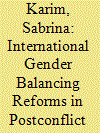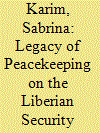|
|
|
Sort Order |
|
|
|
Items / Page
|
|
|
|
|
|
|
| Srl | Item |
| 1 |
ID:
143794


|
|
|
|
|
| Summary/Abstract |
Increasingly UN peacekeeping missions are helping to implement security sector reforms (SSR), including gender reforms, targeted at the local police of host countries. This study uses the UN Mission in Liberia (UNMIL) and the Liberian National Police (LNP) as a way to explore whether SSR may have helped improve individual officers' professional and gender competencies. Conducting a novel lab-in-the-field experiment, we test the individual competencies of 612 LNP officers, also analysing possible determinants of these competencies. We find that most officers have knowledge about statutory crimes and evidence gathering, most officers participate in group activities, almost half are aware of gendered crimes and that male and female officers are equally competent. However, our results suggest that the reforms are at the nascent stages of working, and that more focus should be put into basic training and gender mainstreaming in the Liberian National Police, especially as new recruits are added.
|
|
|
|
|
|
|
|
|
|
|
|
|
|
|
|
| 2 |
ID:
143326


|
|
|
|
|
| Summary/Abstract |
Sexual exploitation and abuse (SEA) is an endemic problem in UN peacekeeping missions. It is not only a gross human rights violation, but also threatens to challenge the legitimacy of the peacekeeping mission and undermines the promotion of gender equality in host countries. We examine if the composition of peacekeeping forces along two dimensions – the proportion of women and the records of gender (in)equality in the contributing countries – helps explain variation in SEA allegations. Analysis of mission-level information from 2009 to 2013 indicates that including higher proportions of both female peacekeepers and personnel from countries with better records of gender equality is associated with lower levels of SEA allegations reported against military contingents. We conclude that substantial reductions in SEA perpetrated by peacekeepers requires cultivation of a value for gender equality among all peacekeepers – improving the representation of women may help but still stops short of addressing the root of the problem.
|
|
|
|
|
|
|
|
|
|
|
|
|
|
|
|
| 3 |
ID:
182662


|
|
|
|
|
| Summary/Abstract |
The use of forced recruitment strategies during war can adversely affect military effectiveness and human rights. Given these costs, under what conditions do state leaders adopt coercive recruitment during civil wars? We find that between 1980 and 2009, states changed their recruitment practices 140 times during civil wars – half of which were towards coercive recruitment. Since structuralist explanations focus on factors that remain more or less constant over time, they cannot explain the frequency of these changes. Instead, we focus on individual-level factors and argue that leaders’ dispositions as risk-takers determine their beliefs about using force to solve collective action dilemmas during civil wars. Further, conflict context matters for leaders’ recruitment decisions – when rebel groups engage in coercive recruitment, leaders may also feel more justified in using such strategies. Using the LEAD Dataset and data on recruitment, we find that risk-tolerant leaders, including those who have had careers in the security sector, as well as those who have prior experience as a rebel or revolutionary leader, are more likely to use force to increase recruitment. While we theorize that this effect may be mitigated by combat experience, the evidence is mixed. Lastly, we find that rebels’ use of forced recruitment makes state leaders less likely to use voluntary recruitment.
|
|
|
|
|
|
|
|
|
|
|
|
|
|
|
|
| 4 |
ID:
161433


|
|
|
|
|
| Summary/Abstract |
In the aftermath of civil conflict, war-torn states often require reform of their government institutions. Gender balancing, or the inclusion of more women in security-sector institutions, is an increasingly common reform incorporated into state-building processes. Our theoretical priors suggest that gender balancing may influence unit cohesion, operational effectiveness with respect to sexual and gender-based violence, and organizational gender norms. We study these propositions using laboratory experiments with police officers of the Liberian National Police (LNP). We randomly assigned the proportions of women and men in 102 groups of six LNP officers to observe their deliberative processes and group choices. In our experiment, adding more women increased unit cohesion, but we find no evidence to suggest that simply adding more women would increase group (or individual) sensitivity to sexual and gender-based violence. We also find that, despite an increase in participation and influence by women, male beliefs about women's role in policing do not improve with the inclusion of women. As one of the first experimental studies to assess the effects of gender composition within the actual population of interest, our results shed light on how international interventions to address gender equality in postconflict countries affect important outcomes related to security.
|
|
|
|
|
|
|
|
|
|
|
|
|
|
|
|
| 5 |
ID:
185078


|
|
|
|
|
| Summary/Abstract |
The US and UN are two of the largest patrons of police reform programs worldwide: between 2000 and 2020, the US provided approximately $160 billion in police assistance to more than 130 countries worldwide; simultaneously, the UN spent over $77 billion supplying police-oriented security sector reform to countries experiencing or having experienced armed conflict, doing so through the deployment of peacekeeping missions and within the offices of UN Police, the UN’s hub for police reform and training programs. Though these two providers seek the same overall objective, they often vary in their specific goals: the US often engages in foreign police reform to promote its own national security objectives by increasing institutional capacity, while the UN adopts police reform programs to promote institutional constraint. The two models have important implications for how we understand bilateral and multilateral reform programs, including activities performed and recipient countries targeted across both time and space. Using originally collected data on US security assistance programs as well as a careful analysis of original data on UN mandates, this article provides the first quantitative exploration of these two different modes of assistance, comparing and contrasting their objectives and where, when, and how they are provided.
|
|
|
|
|
|
|
|
|
|
|
|
|
|
|
|
| 6 |
ID:
174094


|
|
|
| 7 |
ID:
152326


|
|
|
|
|
| Summary/Abstract |
United Nations policy forbids its peacekeepers and other personnel from engaging in transactional sex (the exchange of money, favors, or gifts for sex), but we find the behavior to be very common in our survey of Liberian women. Using satellite imagery and GPS locators, we randomly selected 1,381 households and randomly sampled 475 women between the ages of eighteen and thirty. Using an iPod in private to preserve the anonymity of their responses, these women answered sensitive questions about their sexual histories. More than half of them had engaged in transactional sex, a large majority of them (more than 75 percent) with UN personnel. We estimate that each additional battalion of UN peacekeepers caused a significant increase in a woman's probability of engaging in her first transactional sex. Our findings raise the concern that the private actions of UN personnel in the field may set back the UN's broader gender-equality and economic development goals, and raise broader questions about compliance with international norms.
|
|
|
|
|
|
|
|
|
|
|
|
|
|
|
|
| 8 |
ID:
172541


|
|
|
|
|
| Summary/Abstract |
Under what conditions does state expansion into limited statehood areas improve perceptions of state authority? Although previous work emphasizes identity or institutional sources of state legitimacy, I argue that relationships between state agents and citizens drive positive attitude formation, because these relationships provide information and facilitate social bonds. Moreover, when state agents and citizens share demographic characteristics, perceptional effects may improve. Finally, citizens finding procedural interactions between state agents and citizens unfair may adopt negative views about the state. I test these three propositions by randomizing household visits by male or female police officers in rural Liberia. These visits facilitated relationship building, leading to improved perceptions of police; shared demographic characteristics between police and citizens did not strengthen this effect. Perceptions of unfairness in the randomization led to negative opinions about police. The results imply that relationship building between state agents and citizens is an important part of state building.
|
|
|
|
|
|
|
|
|
|
|
|
|
|
|
|
|
|
|
|
|